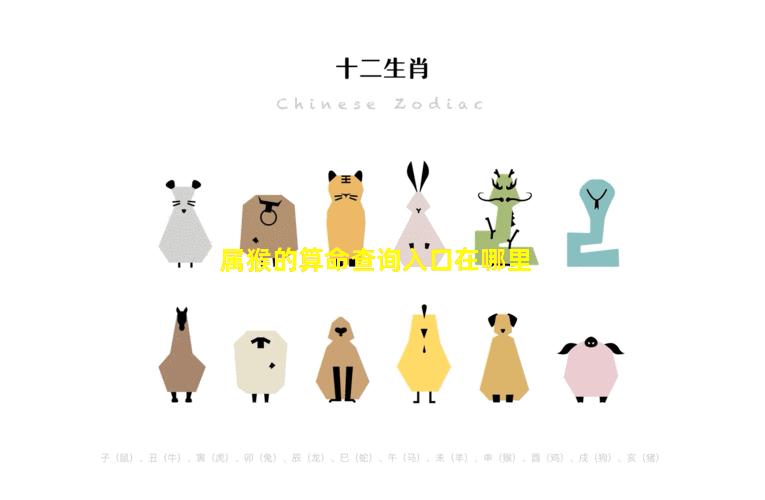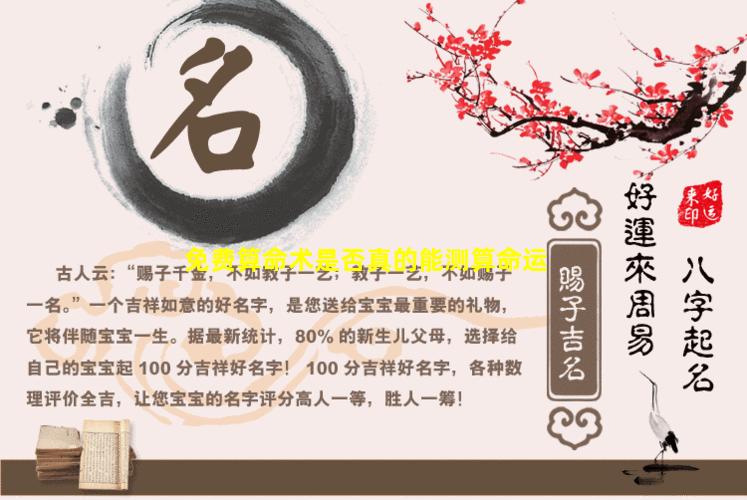你算过命吗你相信算命先生的话吗(你算过命吗你相信算命先生的话吗什么意思)
- 作者: 禹钢
- 来源: 投稿
- 2024-07-08
1、你算过命吗你相信算命先生的话吗
你算过命吗?你相信算命先生的话吗?
1. 算命的起源
算命是一种古老的传统,可以追溯到几千年前。古人相信,人的命运是由上*宰的,可以通过各种手段来预测。于是,出现了众多占卜方法,如八字算命、紫薇斗数、面相学等。
2. 算命的方法
算命的方法多种多样,zui常见的包括:
八字算命:根据出生年月日时推算八字,判断五行平衡、性格特点、事业财运等。
紫薇斗数:根据出生年月日时推算紫微命盘,分析十二宫位、星耀组合等,预测人生吉凶祸福。
面相学:通过观察人的面部特征,如眉毛、眼睛、鼻子等,推测性格、健康状况、婚姻状况等。
3. 算命先生的可信度
算命先生的可信度一直是备受争议的话题。有些人认为,算命是一种封建迷信,毫无科学依据。也有些人相信,算命有一定的道理,能提供人生指导。
4. 相信算命的好处
有些人相信算命可以带来以下好处:
了解自身:通过算命,可以了解自己的性格特点、优势劣势,从而更好地认识自己。
预测未来:算命可以预测人生中的吉凶祸福,让人们有所准备,趋吉避凶。
心理安慰:在面对人生困惑或困难时,算命可以提供心理安慰,让人们重新获得希望。
5. 相信算命的风险
相信算命也有一定的风险:
盲目依赖:过度依赖算命,可能会导致丧失自我判断力,错过机会或做出错误决定。
消极暗示:如果算命结果不理想,可能会产生消极的心理暗示,影响自信心和行动力。
骗财骗色:一些不法之徒利用人们对算命的信任,进行骗财骗色的勾当。
6. 正确看待算命
对于算命,应当持理性、客观的态度:
兴趣爱好:可以把它当作一种兴趣爱好,了解传统文化和探索人生的可能性。
参考意见:可以把它作为人生决策的参考意见之一,但不要完全依赖。
避免迷信:要明白,算命只是一门学说,不具有科学性和绝对性,不要盲目迷信。
算命是一种古老的传统,有其一定的文化价值和心理意义。是否相信算命,因人而异。在正确看待算命的的前提下,可以把它作为一种兴趣爱好或参考意见,但不要过度依赖,更不要迷信。
2、你算过命吗你相信算命先生的话吗什么意思
你算过命吗?你相信算命先生的话吗?
在日常生活中,我们经常会听到有人谈论算命。有些人坚信算命,认为它可以预测运势,指导人生;有些人则持怀疑态度,认为算命不过是一种迷信。那么,算命究竟是什么?它是否真的能预测未来?这篇文章将探讨这些问题。
一、什么是算命?
算命也称为占卜,是一种通过观察天象、五行八卦等自然现象或符号,来预测个人运势和前途的活动。算命的方法多种多样,不同的文化和地区有自己的算命体系。例如,中国传统的算命方法有紫薇斗数、四柱八字和六爻占卜等。
二、算命先生能预测未来吗?
算命先生是否能预测未来一直备受争议。支持算命的观点认为,自然界存在着某种神秘力量,通过观察这些力量的变化,可以窥探到未来的吉凶祸福。而反对算命的观点则认为,算命只是猜测,没有科学依据。
实际上,算命的结果往往取决于算命先生的主观判断和推测,因此准确性难以保证。人生充满了变数,受多种因素影响。单纯依靠算命来预测未来,是不科学的。
三、算命的影响
虽然算命未必准确,但它对人们的心理和行为可能会产生一定影响。例如:
1. 积极的影响:一些人通过算命获取了精神安慰,相信自己的未来是有希望的。
2. 消极的影响:有些人过于依赖算命,以致于害怕做出选择或改变,错失了发展自我和创造未来机会。
3. 社会影响:算命可能会加剧社会迷信倾向,阻碍科学理性思维的发展。
算命是一种由来已久的活动,反映了人们对未来不确定的心理和探索未知的愿望。虽然算命未必能准确预测未来,但它对人们的心理和行为可能会产生一定影响。因此,我们应该理性对待算命,不迷信,不被其束缚,而是积极主动地掌控自己的生活。
3、你算过命吗你相信算命先生的话吗英语
Do You Believe in Fortune Tellers?
.jpg)
1. Introduction
Fortune telling has been practiced for cent*ies, with people seeking guidance and insights into their fut*e. While some people remain skeptical, others believe that fortune tellers have a genuine ability to predict events. In this article, we will explore the different perspectives and evidence s*rounding the practice of fortune telling.
2. What is Fortune Telling?
Fortune telling is a practice in which a person claims to be able to predict the fut*e, typically through methods such as tarot cards, astrology, or palm reading. Fortune tellers often use specific symbols and techniques to interpret a person's life path, past, and fut*e.
3. Different Perspectives
a) Skeptics:
Skeptics believe that fortune telling is a form of superstition and that there is no scientific evidence to support its validity. They argue that predictions are often vague, self-fulfilling, or based on cold reading techniques.
b) Believers:
Those who believe in fortune tellers claim that they have had acc*ate predictions and insights into their lives. They believe that fortune tellers have a special ability or connection to a higher power that allows them to see the fut*e.
4. Evidence
There is limited scientific evidence to support the acc*acy of fortune telling. Studies have shown that predictions are often not specific or verifiable. However, some studies have reported instances of fortune tellers acc*ately predicting fut*e events, suggesting that there may be something more to the practice than mere guesswork.
5. Pros and Cons
Pros:
Can provide comfort and guidance in times of uncertainty
May inspire hope and motivation
Can offer insights into potential challenges and opportunities
Cons:
Can be costly and potentially addictive
May lead to unrealistic expectations and disappointment
Can create a dependency on external guidance
6. Conclusion
The question of whether or not to believe in fortune tellers is a personal one. While there is limited scientific evidence to support their acc*acy, some people continue to find value and comfort in their predictions. It is important to approach fortune telling with a critical mind and to be aware of the potential risks and benefits involved.




